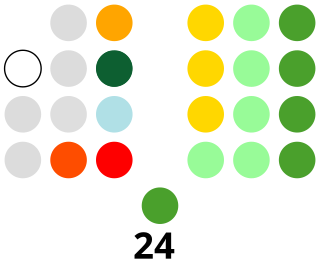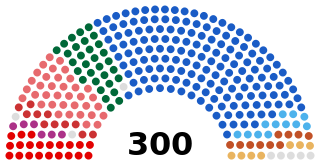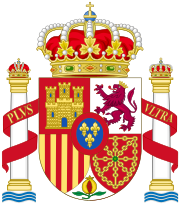A question time in a parliament occurs when members of the parliament ask questions of government ministers, which they are obliged to answer. It usually occurs daily while parliament is sitting, though it can be cancelled in exceptional circumstances. Question time originated in the Westminster system of the United Kingdom, and occurs in other countries, mostly Commonwealth countries, who use the system.
President of the Senate is a title often given to the presiding officer of a senate. It corresponds to the speaker in some other assemblies.

The Congress of the Philippines is the legislature of the national government of the Philippines. It is bicameral, composed of an upper body, the Senate, and a lower body, the House of Representatives, although colloquially, the term "Congress" commonly refers to just the latter. The Senate meets at the GSIS Building in Pasay, while the House of Representatives meets at the Batasang Pambansa in Quezon City, which also hosts joint sessions.

The president of the Senate is the presiding officer of the Australian Senate, the upper house of the Parliament of Australia. The counterpart in the lower house is the speaker of the House of Representatives. The office of the presidency of the senate was established in 1901 by section 17 of the Constitution of Australia. The primary responsibilities of the office is to oversee senate debates, determine which senators may speak, maintain order and the parliamentary code of conduct during sessions and uphold all rules and orders of the senate. The current president is Sue Lines, who was elected on 26 July 2022.

The Congress of Deputies is the lower house of the Cortes Generales, Spain's legislative branch, the upper house being the Senate. The Congress meets in the Palace of the Parliament in Madrid.

The Senate is the upper house of the Cortes Generales, which along with the Congress of Deputies – the lower chamber – comprises the Parliament of the Kingdom of Spain. The Senate meets in the Palace of the Senate in Madrid.

The speaker of a deliberative assembly, especially a legislative body, is its presiding officer, or the chair. The title was first used in 1377 in England.

In New Zealand, the speaker of the House of Representatives, commonly known as the speaker of the House, is the presiding officer and highest authority of the New Zealand House of Representatives. The individual who holds the position is elected by members of the House from among their number in the first session after each general election. They hold one of the highest-ranking offices in New Zealand. The current Speaker is Gerry Brownlee, who was elected on 5 December 2023.

The Parliament of the Democratic Socialist Republic of Sri Lanka is the supreme legislative body of Sri Lanka. It alone possesses legislative supremacy and thereby ultimate power over all other political bodies in the island. It is modeled after the British Parliament.

The Parliament of the Hellenes, commonly known as the Hellenic Parliament, is the unicameral legislature of Greece, located in the Old Royal Palace, overlooking Syntagma Square in Athens. The parliament is the supreme democratic institution that represents the citizens through an elected body of Members of Parliament (MPs).

The Chamber of Representatives is one of the two chambers in the bicameral Federal Parliament of Belgium, the other being the Senate. It is considered to be the "lower house" of the Federal Parliament.

The National Assembly is Mauritius's unicameral legislature, which was called the Legislative Assembly from 1968 until 1992, when the country became a republic. Prior to 1968 and under British rule it was known as the Legislative Council. The Constitution of Mauritius provides for the parliament of Mauritius to consist of the President and the National Assembly. The parliament of Mauritius is modelled after the Westminster system of parliamentary democracy, where members of parliament are voted in at regular general elections, on the basis of a first past the post system. The working language of the National Assembly is English.

The speaker of the House of Representatives of the Philippines, more popularly known as the House speaker, is the presiding officer and the highest-ranking official of the lower house of Congress, the House of Representatives, as well as the fourth-highest official of the government of the Philippines.

The Speaker of the Parliament of the Democratic Socialist Republic of Sri Lanka is the presiding officer of the chamber. The current Speaker of the Parliament is Mahinda Yapa Abeywardena, in office since 20 August 2020. The Speaker fulfills a number of important functions in relation to the operation of the House, which is based upon the British Westminster parliamentary system.

The president of the Congress of Deputies is the speaker of the Congress of Deputies, the lower house of the Cortes Generales. The president is elected among the members of the Congress and is, after the king and the prime minister, the highest authority in the Kingdom of Spain.

The president of the Senate is the presiding officer of the Spanish Senate, the upper house of Spain's Cortes Generales. It is the fourth authority of the country after the Monarch, the Prime Minister and the President of the Congress of Deputies. The president is elected among and by the incumbent senators. When the president is unable to exercise power, vice presidents of the Senate exercise the powers of the Senate president.
The Bureau of the Chamber of Deputies of Brazil is the body responsible for the direction of the legislative and administrative services of the Chamber of Deputies of Brazil.

The Board of Spokespersons is a parliamentary body of the Cortes Generales mainly entrusted with the task of ordering the agenda of the Parliament. As a bicameral legislature, the Cortes Generales are formed by two houses, the Senate and the Congress of Deputies. The Board meets every week.

Parliamentary groups in Spain are the union of members of parliament who may or may not belong to the same political party, but with the same or similar political ideology. The figure of the parliamentary group is common to the Cortes Generales, the national parliament of Spain, and the regional legislatures.

The Permanent Deputation, in Spain, is a parliamentary body consisting of a reduced number of members of parliament which assume the legislative powers of the Parliament when it is not in session. The members of this body are chosen proportionally to the number of deputies that each political group has. The chair of a permanent deputation is normally the speaker of the Parliament.

















